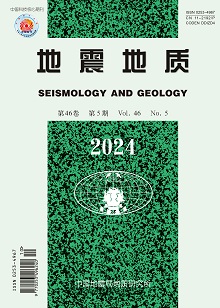Wavelet Maxima Method for Identifying Singularities in Electromagnetic Signal
Q3 Earth and Planetary Sciences
引用次数: 0
Abstract
Wavelet maxima method as a kind of data mining method has been applied to earthquake science research,which gives us a direct way to identify the singularities of different time and frequencies in the long time observations. This paper introduces how to identify the electromagnetic anomalies using the wavelet maxima,i.e.,the wavelet coefficients are calculated by using continuous wavelet transform and then calculate the maximum value of wavelet coefficients in each scale and identify the singularities associated with the earthquake. The identified singularities are further examined by Lipschitz-exponent α. The proposed method has been employed using the 35 days' data of the electromagnetic field recorded in Baosheng station in Sichuan after the Lushan MS7. 0 earthquake,and three electromagnetic anomalies are collected,then,the relationships between the electromagnetic anomalies and the earthquakes are discussed. This method cannot give a certain relationship between the electromagnetic anomaly and earthquake,but it proves the method's effectiveness in extracting the electromagnetic anomaly in continuous observation data.电磁信号奇异点识别的小波极大值法
小波极大值法作为一种数据挖掘方法已被应用于地震科学研究,它为我们在长时间观测中识别不同时间和频率的奇点提供了一种直接的方法。本文介绍了如何利用小波极大值识别电磁异常。,利用连续小波变换计算小波系数,然后计算各尺度小波系数的最大值,识别与地震有关的奇异点。用lipschitz指数α进一步检验已识别的奇异点。利用芦山MS7地震发生后四川宝胜站35 d的电磁场资料,对所提出的方法进行了应用。在此基础上,收集了3个电磁异常,讨论了电磁异常与地震的关系。该方法不能给出电磁异常与地震的一定关系,但证明了该方法在连续观测资料中提取电磁异常的有效性。
本文章由计算机程序翻译,如有差异,请以英文原文为准。
求助全文
约1分钟内获得全文
求助全文
来源期刊

地震地质
Earth and Planetary Sciences-Geology
CiteScore
2.10
自引率
0.00%
发文量
3162
期刊介绍:
SEISMOLOGY AND GEOLOGY focuses on the latest research results in active tectonics, neotectonics, internal geophysics, tectonophysics, geodynamics, geochemistry, earthquake prediction, new chronology, engineering earthquakes, volcanology, and mitigation of geological disasters. Main Columns: Research Papers, Scientific Newsletters, Application of New Technology, Topical Reviews, Academic Controversies, SEISMOLOGY AND GEOLOGY has been published in China Science Citation Database (CSCD), China Periodicals Network, China Scientific and Technical Papers Statistical Source Database (CSTPCD), China Core Journals (Selection) Database, Chinese Scientific and Technical Journals Excellence Database, Abstracts Magazine, and China Science and Technology Journal of Excellence Database. Database, AJ of VINITI [Russia], Cambridge Scientific Abstracts [USA], Japan Science and Technology Society (Chinese Literature), scopus [Netherlands], Ulrich's Guide to Periodicals [USA], and other 18 famous domestic and foreign retrieval systems.
 求助内容:
求助内容: 应助结果提醒方式:
应助结果提醒方式:


